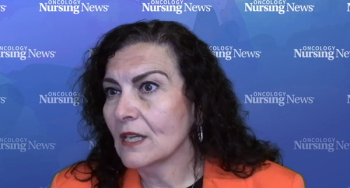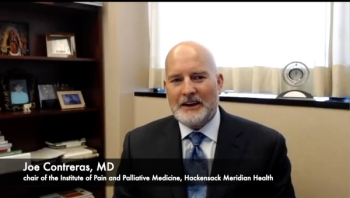
Danielle Blair, RN, BSN, OCN, CCRP, explains what her role as an adolescent and young adult nurse navigator in oncology entails.

Danielle Blair, RN, BSN, OCN, CCRP, explains what her role as an adolescent and young adult nurse navigator in oncology entails.

Emily Coiro, MSN, AGACNP-BC, BMTCN; and Julie Zgola, BSN, RN, who work in stem cell transplantation, were matched with patients in need of a transplant.

Developing a strong working relationships and understanding the physical and emotional demands of the oncology specialty are some ways nurses can address burnout, an expert said.

An oncology nurse practitioner highlights the benefits of attending conferences like the ASCO Annual Meeting.

In this episode of The Vitals, we speak with an expert who discussed the importance of supportive care and education for patients with lung cancer who are treated with immunotherapy.

Oncology nurses provide patients with lung cancer the education and empathy needed to navigate treatment options and adverse event management.

Wearable technology can track hand hygiene protocol adherence, making wards more aware of their hand washing and sanitizing rates on a weekly basis.

An expert discussed how approaching the stigma around lung cancer in an empathetic way may be the tool to help eliminate disparities around screening for the disease.

The John Theurer Cancer Center was recognized by the Oncology Nursing Society as a 2024 Outstanding Employer, which recognizes employers that show exemplary support for their oncology nurses.

Immunotherapy has changed the face of cancer treatment, but requires appropriate irAE management to reach full potential.

Gabriella Magarelli, MSN, ACNP-BC, AOCNP, reflects on lessons learned caring for patients with cancer and COVID-19.

Special protocols are required to ensure the safety of patients undergoing bone marrow transplants.

Oral decitabine, an oral fixed-dose of combination decitabine and CDA inhibitor cedazuridine, is an FDA-approved therapy for patients with lower-risk myelodysplastic syndromes.

The chair of the Institute of Pain and Palliative Care explains how the holistic approach of palliative care makes it a unique treatment modality.

The chair of the Institute of Pain and Palliative Care explains how patients with cancer may improve their treatment outcomes with palliative care.

Joe Contreras, MD, chair of the Institute of Pain and Palliative Medicine, explains how some common misconceptions may be hindering patients from receiving potentially outcome-improving palliative care.

For National Hospice and Palliative Care Awareness Month, Joe Contreras, MD, spoke to Oncology Nursing News® about some common misconceptions between the 2 and how oncology nurses can more effectively speak with their patients about palliative care.